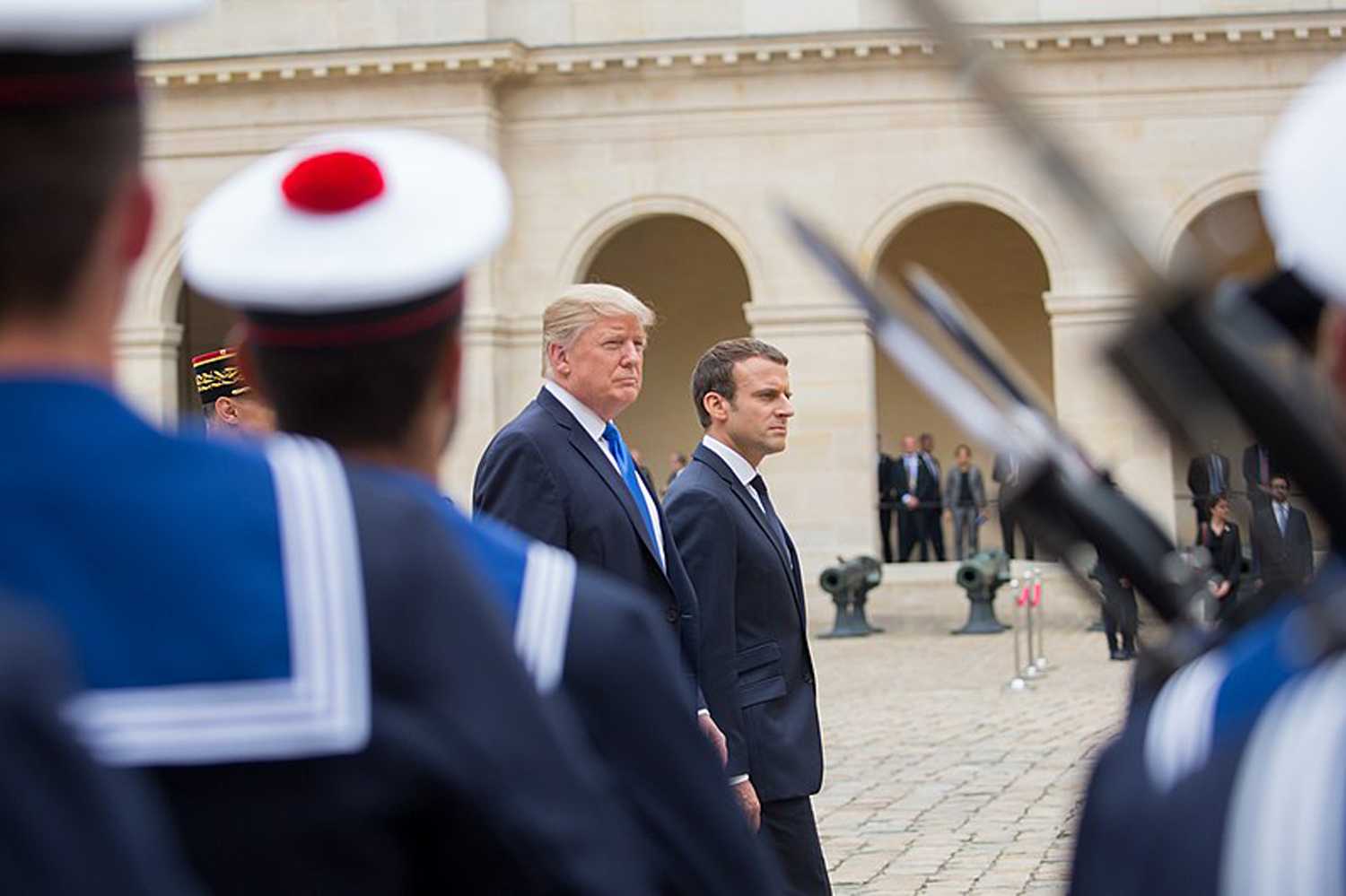Editorial: Heed Macron’s warning about nationalism


U.S. President Donald Trump and French President Emmanuel Macron were photographed together at an event in Paris on July 13, 2017.
While world leaders marched somberly together down the Champs-Elysees in Paris on Sunday for the centennial anniversary of the armistice that ended World War I, President Donald Trump arrived separately. Russian President Vladimir Putin made the same choice.
Eyes around the world watched these subtle choices through the lens of 100 years of international tensions and history. The day demonstrated that a century hasn’t made foreign relations any simpler — in fact, we may be sliding back into old habits. And French President Emmanuel Macron made a serious case for the collective good at a time when the forces of nationalism are dividing the world in the same way they did leading up to WWI.
No one espouses nationalism quite as well as Trump. He went his own way through much of the weekend’s events — on Saturday he cancelled a trip to a WWI battleground outside of Paris because of rain, for which he received well-deserved criticism. Then the next day, while Macron, German Chancellor Angela Merkel and other foreign leaders held a peace forum, Trump skipped out to visit an American cemetery also outside of the city.
Trump has recently embraced the word “nationalism” in spite of its heavy implications of racism. At a rally in Houston three weeks ago, he said, “Really, we’re not supposed to use that word. You know what I am? I’m a nationalist, OK? I’m a nationalist. Nationalist! Use that word! Use that word!”
The president is evidently aware of the fact that recent presidents before him refrained from using the word, for very good reasons. And it’s this flippant language and acceptance of national importance above the global good that Macron warned against in Paris on Sunday.
“The old demons are rising again, ready to complete their task of chaos and of death,” Macron said, referencing the international conditions of growing nationalist sentiment that led to the outbreak of WWI.
His remark seemed to be directed directly at Trump and the U.S. president’s embrace of nationalism, which he condemned strongly.
“Patriotism is the exact opposite of nationalism,” he said. “Nationalism is a betrayal of patriotism by saying, ‘Our interest first. Who cares about the others?’”
Macron was warning that we should all care about the others. The world has had 100 years to learn from its mistakes, and yet the president of the United States — and the president of Russia — still insists on turning a blind eye to history while threatening global stability. Trump has abandoned international climate agreements, nuclear treaties and trade treaties. He’s spoken against the European Union and the North Atlantic Treaty Organization, and villainized people from other countries.
Meanwhile, Macron stressed the need for international cooperation instead of divisive language and actions.
“I do defend my country,” he said. “I do believe that we have a strong identity. But I’m a strong believer in cooperation between the different peoples, and I’m a strong believer of the fact that this cooperation is good for everybody, where the nationalists are sometimes much more based on a unilateral approach and the law of the strongest, which is not my case.”
Macron’s message is clear, and one we need to hear. Allowing nationalism to overtake the globe didn’t end well the first time — we should beware falling to it again.
Recent Posts
Opinion | Duolingo: A beacon of hope or an agent of evil?
Duo was brutally plowed down by a shiny, ugly Tesla Cybertruck. By extension, Elon Musk…
Marcello Hernández fans fill WPU Assembly Room, and then some
On Monday night, comedian Marcello Hernández “came all this way” to Pitt, delivering a set…
97th Academy Awards post-mortem: Should we replace the Academy voters with a poll on Letterboxd?
While blockbusters like “Dune: Part Two” and cultural phenomena like “Challengers” dominated at the box…
Five years later: COVID-19 and quarantine’s lasting legacy in national and local health care industries
At the fifth anniversary of the COVID-19 pandemic, UPMC and Pitt Student Health Services reveal…
Column | DK Metcalf trade is reputation-defining for Steelers’ front office
At a turning point in the franchise, Pittsburgh Steelers fans were enthused when Omar Khan…
‘H2PinskyBudike’ ticket wins 2025 SGB election
Student Government Board announced election results for president, vice president, and board member positions and…

